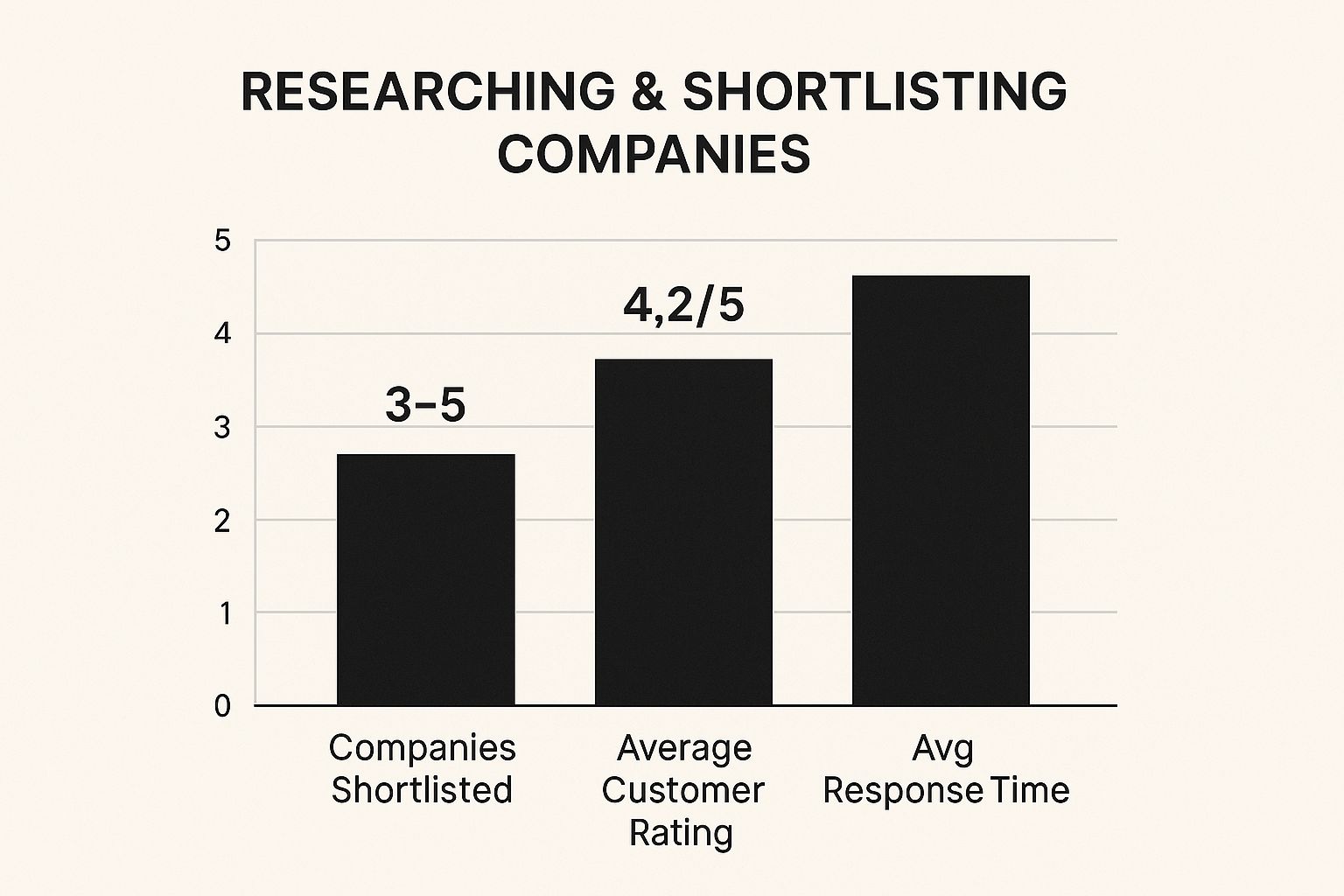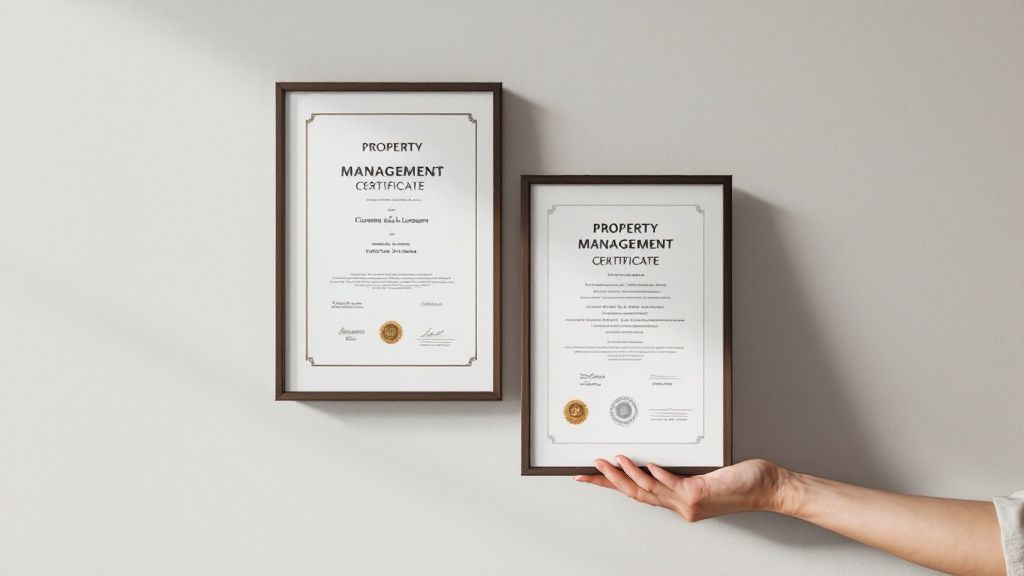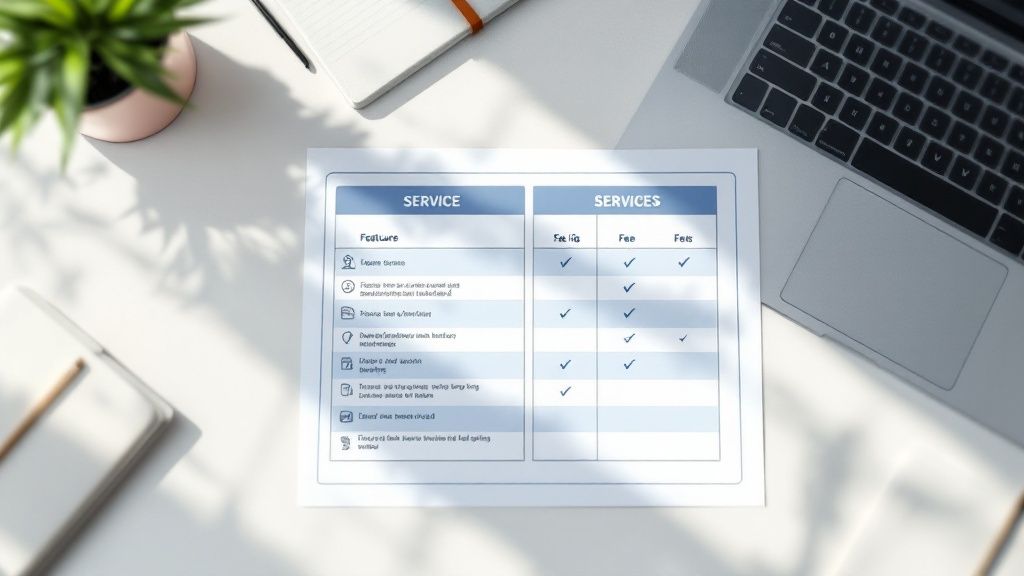How to Choose Property Management Company: Expert Tips

Before you even think about picking up the phone or searching online, the most crucial part of choosing a property management company happens right at your own desk. It’s all about figuring out what you actually need. This isn't just about finding the cheapest fee; it's about finding a true partner who gets your investment style and can handle the specific demands of your property.
Get this first step wrong, and you'll be endlessly frustrated. Get it right, and you'll find a partner who makes your life easier and your investment more profitable.
First Things First: Define What You're Looking For

Before diving into a sea of local property managers, the real work starts with a bit of honest self-reflection. The goal isn’t to find the universally "best" company, but the one that's the absolute right fit for you. A management style that's a dream for a hands-off, seasoned investor could easily be a nightmare for a first-time landlord who wants to stay in the loop.
Taking the time to define your needs upfront is your best defense against a slick sales pitch or a low-ball price that hides a world of headaches. You’re building a blueprint for your ideal partnership, which turns a fuzzy search into a focused mission.
How Hands-On (or Hands-Off) Do You Want to Be?
Your personality and lifestyle are huge factors here. Do you want to sign off on every little repair, or would you rather just see a deposit in your bank account each month and not worry about the details?
Think about where you land on this spectrum:
- The Delegator: You want to set it and forget it. Your perfect manager is a self-starter who handles everything from tenant calls to minor repairs without needing your approval for every little thing.
- The Collaborator: You like being involved in the big decisions, like picking a new tenant or approving a significant repair over, say, $500. You need a manager who’s a great communicator and welcomes your input.
- The Micro-Manager: You want to know everything that's happening, with detailed updates and control over most decisions. This style can be tough to accommodate, but some full-service firms are built for it, offering detailed owner portals and constant communication.
There's no right or wrong answer, but being honest with yourself is key. If you're a Delegator, a company that bombards you with questions will drive you crazy. If you’re a Collaborator, a manager who goes radio silent will just make you anxious.
Write a "Job Description" for Your Property
Think of this like you're hiring for a critical role in your own business—because you are. You wouldn't hire a key employee without a clear job description, right? The same principle applies to managing your asset. Your property is unique, and it needs a specific kind of expertise.
Is it a luxury single-family home that needs a manager who understands white-glove service? Or is it a student-heavy apartment building near campus that requires a pro at handling high turnover and marketing to a younger crowd?
When you define the job before you interview candidates, you completely change the dynamic. You're not just a customer buying a service anymore. You're an employer looking for a specific set of skills to protect and grow a major asset.
Jot down a document that outlines exactly what you expect. This "job description" should cover your preferences on things like financial reporting (a simple P&L or every single receipt scanned?) and communication (a monthly email summary or instant text alerts for maintenance issues?). This document becomes your yardstick for evaluating every company you talk to, helping you make a decision based on facts, not just a gut feeling.
Decoding Service Offerings and Fee Structures
Alright, let's get into the nitty-gritty. Once you have a clear picture of what you need, it's time to pull back the curtain on what property management companies actually do and—more importantly—how they charge for it. That headline monthly management fee you see advertised? It's just the tip of the iceberg.
A low management fee can look incredibly appealing on the surface, but it's often a smokescreen for a fee structure that will nickel-and-dime you on the back end. On the flip side, a higher, all-inclusive rate might seem steep initially but often leads to more predictable costs and fewer headaches down the road.
This isn't a simple choice anymore. The U.S. property management market is exploding, projected to jump from $81.52 billion in 2025 to $98.88 billion by 2029, fueled by a surge in rental property investments. This boom means more companies are vying for your business with increasingly complex service models. For a deeper dive, you can explore more insights on property management market trends on DoorLoop.
Core Services: The Bare Minimum
No matter who you consider, there are some non-negotiable fundamentals every reputable property manager should handle. These are the basics that keep your investment running smoothly.
- Marketing and Tenant Placement: This is more than just a "For Rent" sign. It means professional photos, compelling listings on all the major rental sites, and handling the flood of inquiries and showings.
- Serious Tenant Screening: This is one of the most critical steps. They should be running comprehensive background checks, verifying credit, calling references, and confirming income to find you a tenant who will pay on time and respect your property.
- Rent Collection and Financials: Their job is to collect rent, chase down late payments, and provide you with clear, easy-to-understand financial statements each month. No excuses.
- Maintenance Coordination: They act as the point person for all those tenant repair calls, dispatching trusted vendors and overseeing the work from start to finish.
The data below gives you a few benchmarks to think about as you start comparing companies. It's not just about what they do, but how well they do it.

As you can see, a company's responsiveness is just as important as its star rating. When a pipe bursts at 2 AM, you'll be glad you picked the one that answers the phone.
Comparing Common Property Management Fee Structures
To truly compare your options, you need to understand the different ways companies charge for their services. A low percentage fee might hide a ton of add-ons, while a flat fee could offer simplicity. The table below breaks down the most common structures so you can see what's really behind the numbers.
| Fee Type | Typical Range | What It Covers | Red Flags to Watch For |
|---|---|---|---|
| Percentage of Rent | 8-12% of monthly rent | Day-to-day management: rent collection, tenant communication, maintenance coordination. | Fees charged on rent due instead of rent collected (you pay even if vacant). Unclear what's included vs. extra. |
| Flat-Fee | $100-$200 per unit/month | A fixed monthly cost for a defined set of management services. Predictable budgeting. | A "bare-bones" service list that requires paying extra for essentials like showings or inspections. |
| Leasing Fee | 50-100% of one month's rent | The work to find and place a new tenant: marketing, showings, screening, and lease signing. | Extremely high fees combined with a low monthly percentage. Some charge this and the first month's management fee. |
| Maintenance Markup | 5-15% on vendor invoices | A service charge added to the cost of repairs for coordinating the work. | Markups over 15%. Lack of transparency—they should always provide the original vendor invoice. |
| Miscellaneous Fees | Varies widely | Account setup, lease renewals, eviction processing, technology fees, inspection fees. | A long list of small, recurring fees that add up quickly. Vague descriptions like "administrative fee." |
Getting a complete fee schedule in writing is the only way to do a true "apples-to-apples" comparison. Don't let a slick sales pitch distract you from understanding the total cost of doing business with a company.
Questions You Need to Ask About Fees
When you're interviewing potential managers, don't be shy. Get specific and pin them down on the details—vague answers are a major red flag.
- What is your monthly management fee, and is it based on rent collected or rent due? This is a critical distinction, especially if your property is vacant.
- Do you charge a separate leasing fee to place a new tenant? If so, how much is it, and does that overlap with the first month's management fee?
- What happens when a lease is renewed? Is there a fee? Many companies charge a flat rate or a small percentage for the paperwork to keep a great tenant in place.
- Do you add a markup to maintenance invoices? This is a common practice, but it absolutely must be disclosed. A 5-10% markup is typical. Anything more deserves a closer look.
- What are the costs if an eviction becomes necessary? This can range from a flat fee for filing to hourly charges for court time. You need to know this upfront.
- Are there any other recurring fees I should know about? Think administrative fees, technology fees, or account setup charges. These small costs can add up over a year.
Getting clear, written answers to these questions is the only way to protect your investment. It ensures you're comparing offers accurately and prevents costly surprises from popping up on your statement down the line.
How They Find and Keep Great Tenants

A property manager's real job isn't just collecting rent and calling a plumber. Their true value comes from minimizing your biggest expense: vacancy. Every single day your property sits empty, it's costing you money.
This is why a company's game plan for attracting and keeping quality tenants should be at the very top of your list. Their approach directly hits your bottom line, affecting everything from applicant quality to how often you have to deal with turnover.
Attracting the Right People from the Start
First impressions are everything. If a potential manager shows you listings with dark, blurry phone pictures and a lazy, two-sentence description, that’s a major red flag. You need someone who treats marketing your property like the serious business it is.
A solid marketing plan should be active on multiple fronts. Look for things like:
- Professional Photos & Videos: In today's market, high-quality visuals aren't a luxury; they're a necessity. Ask to see their current listings to get a feel for their standards.
- Wide Exposure: They need to be pushing your property out to all the major rental sites like Zillow, Trulia, and Apartments.com, not just sticking a sign in the yard and calling it a day.
- Speedy Responses: When someone inquires, how fast does their team respond? In a hot rental market, a few hours can be the difference between landing a great applicant and losing them to the competition.
A proactive marketing strategy doesn't just fill vacancies faster—it creates a bigger, better pool of applicants for you to choose from.
The Power of a Bulletproof Screening Process
Once the applications start coming in, the screening process is your first line of defense against future headaches. One bad tenant can cost you thousands in lost rent, legal fees, and damages. A great manager will have a standardized, rock-solid screening process that they apply to every single person, no exceptions.
Don't be afraid to get specific here. Vague answers like "we run a background check" aren't good enough. You need to know their exact minimum standards before you can trust them with your asset.
A thorough screening should always cover these bases:
- Credit Check: What’s their minimum score? This is a great indicator of financial responsibility.
- Income Verification: The industry standard is an income of 3x the monthly rent. Ask how they verify it—pay stubs, offer letters, bank statements?
- Criminal Background: This is crucial for the safety of the property and the neighborhood.
- Eviction History: A prior eviction is one of the biggest red flags you can see. How do they handle it?
- Past Landlord References: Do they actually pick up the phone and call previous landlords? This is where you get the real story on payment history and how they treated the property.
Think of their screening process as the filter that protects your investment. A weak or inconsistent one is a risk you simply can't afford.
Keeping Good Tenants Happy (and Paying)
Finding a great tenant is only half the battle. Keeping them is where you really save money. Tenant turnover is a killer for your cash flow, racking up costs for marketing, cleaning, repairs, and lost rent while the unit is empty.
This all comes down to their approach to tenant relations. How do they handle maintenance requests? Do they have an easy-to-use online portal for tenants to report issues? Prompt communication and quick, professional repairs are the bedrock of a positive rental experience.
Happy tenants are far more likely to renew their leases, which means a stable, predictable income for you. The role of a property manager has evolved; they are now key partners, especially for those navigating the complexities of owning property overseas, a topic we explore in our guide on https://residaro.com/blog/investing-in-european-real-estate. A manager who excels at retention isn't just a vendor; they're an invaluable partner in growing your investment.
Time to Talk: Nailing the Interview and Checking References

Alright, you've done your homework and narrowed down the list. Now for the most revealing part of the whole process: the direct interview. This is your chance to get past the slick marketing and see how these companies really operate under pressure.
A good interview is all about gauging their actual competence, communication style, and whether they're just a good fit for you. Forget simple yes-or-no questions. You need to dig deeper with questions that force them to show their work.
Ask Questions That Uncover Their Real Process
Anyone can claim they "handle evictions." A true pro can walk you through their entire eviction timeline, complete with legal notices and court filings, without missing a beat. Your job is to pull back the curtain on these internal processes.
So, instead of a soft question like, "Do you fill vacancies quickly?" get specific. Try this instead: "What was your average number of days on market for a property like mine over the last six months?" See the difference? You just turned a vague promise into a hard number, a key performance indicator (KPI) that tells a real story.
Here are a few of my go-to questions to see what they're really made of:
- On Money: "Walk me through the lifecycle of a rent payment. When do you collect it, when are your fees taken out, and what specific day of the month will I see the deposit in my account?"
- On Maintenance: "It's Saturday night. A tenant calls about a broken oven—not an emergency, but still urgent. What's your exact procedure for handling that call and getting it fixed?"
- On Late Rent: "A good tenant is 15 days late on rent for the very first time. Describe the exact sequence of communications, calls, and official notices you'll initiate."
Questions like these don't have easy answers. They make a manager explain their systems, revealing just how organized, proactive, and on-the-ball they really are.
The Make-or-Break Step: Checking References
An interview tells you what a company says it does. References tell you what they’ve actually done. This step is completely non-negotiable. It's an unfiltered look at their performance from the people who have been in your shoes.
Don't just accept a cherry-picked list of two happy clients. Push for more. I always ask to speak with two current clients and—this is the important one—one former client. A company that's truly confident in its service won't hesitate.
Speaking with a former client is the ultimate gut check. It can reveal everything from how they handle conflict to why the relationship ended. This is where you hear about the recurring issues that you’d never uncover by talking only to their current fans.
When you get them on the phone, be ready with targeted questions. Go beyond a simple, "Are you happy with them?" You need real, actionable intel. This is especially true if you own property from a distance; for instance, the process of buying a house in Italy has unique hurdles where an amazing local manager is worth their weight in gold.
What to Ask Their Other Clients
To get the most out of these calls, focus on the details that matter to you.
- Communication: How fast do they get back to you? Can you actually reach your dedicated manager when you need them, or do you always get a receptionist?
- Financials: Are your monthly statements always on time and accurate? Have you ever been hit with surprise fees or charges you didn't understand?
- Maintenance: How do they handle repairs? Do you feel the vendors they use do quality work at a fair price?
- Problem-Solving: Can you give me an example of a tough situation—like a major repair or a problem tenant—and tell me exactly how the management company handled it?
Getting honest, detailed answers here is the final piece of the puzzle. It either confirms what you learned in the interview or raises a red flag, giving you the clarity you need to finally make your choice.
Diving into the Property Management Agreement
A firm handshake and a slick website are nice, but the property management agreement is where the rubber meets the road. This is where promises become legally binding, and signing it without a thorough, line-by-line review is a rookie mistake you can't afford to make.
Think of the contract as the blueprint for your entire professional relationship. It lays out exactly how things will work, who’s responsible for what, and perhaps most importantly, how to handle disagreements. A solid agreement protects everyone involved, preventing misunderstandings before they even start.
The Make-or-Break Clauses You Can't Skim
Some parts of that agreement are far more critical than others. These are the clauses that can either be your saving grace or lock you into a nightmare scenario. I always tell owners to zoom in on these sections first and not move on until they understand every single word.
Your mission here is to sniff out any vague language or terms that seem stacked in the company's favor.
- Services and Fees: The contract needs to spell out, in black and white, every service covered by your monthly management fee. Look for a detailed schedule of any extra charges—things like leasing fees, lease renewal fees, maintenance markups, or the cost of an eviction. If it's not in writing, assume it's not included.
- Owner Responsibilities: This part outlines what's expected of you. Usually, it involves things like maintaining proper insurance and keeping a reserve fund topped up for repairs. Just make sure the requirements are fair and something you can realistically handle.
A transparent, easy-to-understand contract is the sign of a professional company. If the agreement feels like it was written in confusing legalese, or if the manager gets cagey when you ask for clarification, that’s a massive red flag.
Know Your Exit Strategy Before You Enter
No matter how great a partnership looks at the starting line, you absolutely need a clear way out if things go south. The termination clause is your escape hatch—understand exactly how it works before you put pen to paper.
What does it take to end the agreement? Can you leave for any reason with proper notice, or do you have to prove the manager did something wrong (terminating "for cause")? The best contracts allow you to terminate without cause, usually with 30- to 90-day written notice. Be very suspicious of agreements with huge early termination fees or long-term auto-renewals that give you a tiny window to opt out.
Who Holds the Reins? Authority and Financials
The agreement gives the property manager the power to act on your behalf, and you need to set clear boundaries. Spending authority is a big one. The contract must state the maximum dollar amount the manager can spend on a single repair without getting your approval first. A common limit is somewhere between $250 and $500. This simple clause prevents you from getting blindsided by a huge invoice for a non-emergency repair you never even knew about.
Liability and indemnification is another key area. This clause usually means you agree not to hold the management company responsible for issues unless they are grossly negligent or commit willful misconduct. While this is pretty standard, read the wording carefully to ensure it's fair and doesn't leave you holding the bag for something that wasn't your fault.
The property management field is huge, with over 304,000 businesses in the U.S. alone as of 2025. You have plenty of options, so don't feel pressured to sign an agreement that doesn't feel balanced. You can dig into more market data in industry reports from IBISWorld.
Finally, make sure the contract fits your specific property. The terms for managing a long-term rental are wildly different from what's needed for a vacation property. For more on that, our guide on property management for vacation homes can help you spot the nuances. And when in doubt, have a lawyer look it over. That small upfront cost can save you a fortune down the line.
Lingering Questions Before You Sign
Even after you’ve done your homework, narrowed the field, and conducted solid interviews, it's completely normal to have a few last-minute questions. This is a big decision. You're handing over a valuable asset, and it pays to be absolutely sure before you sign a contract.
Let's walk through a couple of the most common questions that hang people up at this final stage. Getting these sorted will help you make your final choice with confidence.
Big Company vs. Small Shop: Which is Better?
This is the classic debate, and honestly, there's no single right answer. It really circles back to what you decided you needed from the very beginning. Each has its own flavor, with real pros and cons.
A large, established company can bring a lot of horsepower.
- Serious Tech: They’ve usually invested in slick owner portals, easy online rent payment systems for tenants, and powerful marketing tools that blast your listing across the web.
- Specialized Teams: You’ll often find dedicated departments for things like leasing, accounting, and maintenance. This can mean you have a true expert handling each piece of the puzzle.
- Brand Power: A familiar name can sometimes give tenants an extra dose of confidence and attract a bigger applicant pool right out of the gate.
Then you have the smaller, boutique firms. They often build their business on a different promise.
- A Direct Line: You’re far more likely to have the owner's cell phone number. When something goes sideways, that kind of access is priceless.
- More Wiggle Room: Smaller companies can be more agile. They might be willing to tailor their approach to your specific property instead of sticking to a one-size-fits-all corporate playbook.
- Hyper-Local Knowledge: A small, local team often has an incredibly deep understanding of your specific neighborhood—they know the rental trends block by block and have the best local plumber on speed dial.
Think back to the job description you mentally created for your ideal manager. If you’re all about cutting-edge tech and systems that can scale, a larger firm might be your best bet. But if you crave a personal relationship and a service that feels tailor-made, a boutique company will likely be a much better fit.
At the end of the day, this isn't about "big vs. small." It's about "right vs. wrong for me." A huge company can feel cold and bureaucratic, and a tiny one can get swamped. Judge each on their actual performance, not just their size.
How Much Should I Really Be Paying for a Good Manager?
It’s so tempting to just scan the proposals and pick the one with the lowest monthly fee. I’ve seen countless owners do it, and it's almost always a mistake. The real cost of management isn’t that headline percentage—it’s the total, all-in impact on your bottom line.
Think about it this way: a cheap manager who lets your property sit vacant for 30 days just cost you an entire month of rent. A great manager who charges a bit more but fills that same vacancy in 10 days has already saved you a bundle, making their higher fee a bargain.
When you're looking at cost, reframe it as an investment, not an expense. A top-tier manager proves their worth by delivering tangible results.
- Keeping Vacancies Short: What’s their average "days on market"? A low number is pure gold.
- Keeping Good Tenants Happy: Ask about their lease renewal rate. Renewals save you the costly turnover process.
- Fixing Small Problems Now: A proactive manager who catches a small leak before it becomes a flooded bathroom saves you thousands.
Choosing a property manager just because they have the lowest fee is one of the quickest ways to lose money in real estate. Focus on the value they bring to the table. That’s where you’ll find the real savings.
Finding the right property in Europe is the first step; finding the right partner to manage it is the next. At Residaro, we connect you with premier properties across the continent. Once you've found your dream home, the insights in this guide will help you protect it. Begin your search today at https://residaro.com.